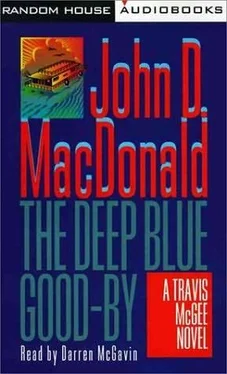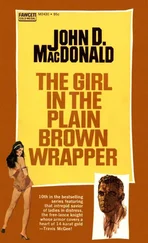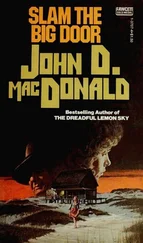I knew that if I could keep it up, time was on my side. He had a bullet in him. Probably he realized he was losing ground. I saw him reach his left hand into the front of his shirt. Another gun? A knife? In sudden fright, I tried to hit him hard enough to finish it but he yanked his head back, catquick, and I missed and sprawled flat as I rolled, I saw him bring something down at my head, and I yanked away It struck me a glancing blow and hit the teak deck and burst. Then there were all the jelly beans, rolling and spilling, scattering and fleeing in the moonlight, the bright treasure from the cloth sack.
e gave a howl of dismay and began scrambling, pouncing, snatching at the round gem stones. Water smashed in, sweeping them inevitably toward the stern, out the scuppers, seeding the deep with riches. I think he forgot for a moment that he had to do something about me. I got low, as I had been taught, and timed the roll, and as he lifted up a little too far, I drove at him, shoulder into the pit of the belly, legs driving. I drove him back into the starboard rail as it dipped low, and he went over, grabbing at me, clawing at me. But I got hold of the rail and he missed it and went into the sea.
I don’t know why I expected him to go down like a stone. I clung to the rail, gasping and gagging, and saw him pop up, snap the water out of his eyes, orient himself, and turn and start churning his way toward the Rut Cry. With a sprained arm, with a bullet in his gut, I could still believe he would make it.
It was out there, rising and falling in the moonlight in a strange kind of panic, I groped for something to throw at him. The Play Pen was drifting in the same direction. He was not getting out of range very fast. There was a big Danforth anchor in the open storage locked in the center of the transom. I pulled it out, chain rattling on the shaft, got the shaft in both hands, braced myself, threw it out there as hard as I could in a high clanking arc. It landed on the back of his head and neck and shoulders just as a wave lifted him, and tumbled forward over his shoulder-and the sea was suddenly empty.
The line which had been bent onto the chain whipped at my ankle. By instinct I stepped on it. I bent weakly and picked it up. I didn’t have the strength to pull the anchor back in. I gave it a couple of turns around the starboard stern cleat. I kept looking for him. I couldn’t believe that anything had ended him. I took a step to catch my balance, and stepped on something like a pebble. I picked it up and put it in my pocket. I pulled myself to the controls. I had to stop all that damned motion before I went out of my mind. I got the engines started, turned it into the wind and put it on dead slow, and jacked the Metal Marine pilot into gear. it took over the wheel, holding it there. My underlip was in two segments, and one was folded down, exposing my teeth on the left side. I put the running lights on. There was a flashlight in a bracket beside the instrument panel. I went below. The violent motion had spilled both women out of the bunks. They lay in the narrow aisle, both face down, Deeleen atop Lois. I heaved Deeleen back up onto the port bunk. She was deep in her sleep, long exhalations rattling in her throat.
I was gentler with Lois, kneeling, turning her, gathering her up. I put the light on her when she was on the bunk. Her face was the color of yeast. Her lips were blue and bloodless. The whole left side of her face was a dark bruise. I could not detect respiration, but when I lay my ear against her chest I thought I could hear a thin, small, slow sound, a thready struggle of the heart.
I covered them both with blankets, tucking them around their bodies, muttering to myself. My head seemed full of distances, of wraiths and, mists, a wide and lonely country encased in a papery fragility of bone.
Find the Tiger’s boat. Priority one. Look downwind. I went to the control and took it out of pilot and swung it to take the sea dead astern, and stepped it up a little. Suddenly I remembered the damned anchor. I wasn’t tracking well. It would be very clever to wind the line around a shaft. A towed anchor will swing up and bobble around in the wake. I put it back on pilot and went astern. I decided I would just release the line and let it go. I put the light back into the wake to see if I could see it. The wake made a smooth hump about forty feet back of the transom. Junior Allen rode that hump, face up out of the water, grinning at me.
Suddenly, as if to show off, as if to prove how well he had everything under control, he made a complete roll, exposing the metallic gleam of the anchor for an instant, then steadying again, face high, making little white bow waves that shot past his ears.
I could not move or think or speak. The known world was gone, and in nightmare I fought something that could never be whipped. I could not take the light off him. He rolled again. And then I saw what it was. His throat was wedged in that space between the flukes of the Danforth, and the edges of the points were angled up behind the corners of his jaw, the tension spreading his jowls into that grin.
I got to the cleat, and with nerveless stumbling hands I freed the line. He disappeared at once as the anchor took him down. I hugged the rail and vomited. When I looked forward, eyes streaming, I suddenly saw I was coming too damned close to running the Rut Cry down. I sprang to the controls, circled it, came up on it slowly, got its line with a boat hook and made it fast to the center cleat in the transom.
I made an estimate of the course, guessed it at two-ninety, and, watching the Rut Cry to see how it rode, I slowly put it up at 2800 rpm. I went down and looked at the women. Lois’s hands were limp and icy. I found a pulse in her throat with my lips. She was alive.
I turned on the ship-to-shore and transmitted on the Coast Guard emergency frequency. On my third try they came in loud and clear. I told them who I was and where I was, and something of the nature of the medical emergency. It was after midnight. My lip made my voice strange. I told them I did not think from the looks of the woman and the sea a copter pickup was feasible. They told me to stand by.
They came back on, and at their request, I took the flashlight and lifted her eyelids and looked at her eyes. I told them one pupil was tiny and the other was very large. They told me to stand by again.
I went topside to look around. I saw a glow of lights on the western horizon. I swung the flashlight beam around and spotted a little red gleam in the scupper. I picked it up. I found three more after that. Five all told, the only ones which hadn’t been washed into the sea.
They came back on and gave me a five-degree course correction, having spotted me in some mysterious way, and told me to make all possible speed for Lauderdale, and come right to Pier 66 gas dock where an ambulance would be waiting. I gave it all it would take. The marine engines roared. At full throttle they turned close to 4500. I backed them off a little. The tanks were half full, I slammed toward home, steering it by hand, the Tiger’s boat wallowing and swinging astern.
Red lights were revolving and blinking on the shiny vehicles parked at the gas dock. I laid it in close and a gang of people swarmed aboard with lines, yelling orders to each other. They came aboard and took the women off, giving them an equally gentle professional handling. I rode to the hospital with them. They stitched my mouth, X-rayed me, taped my ribs, eased my nose back to a reasonably central position.
While they were doing that to me, other people shaved her head and cut into her skull and released the cumulative pressure of the massive cerebral hemorrhage. The operation was a great success.
Three days later the patient died of pneumonia, under oxygen, with me sitting there, staring at her through the Pliofilm, willing every struggling breath she took, until finally she just did not take the next one. She settled smaller then, her face little and gray under the turban of gauze and adhesive.
Читать дальше












